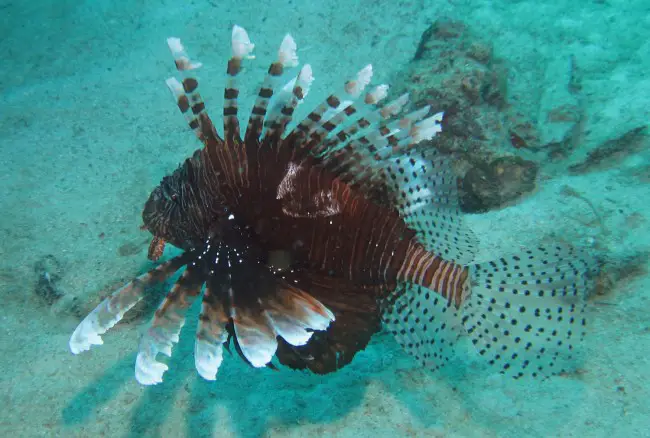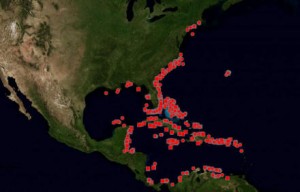
In an effort to determine research and management gaps and to bring together leaders in the lionfish issue, the Florida Fish and Wildlife Conservation Commission (FWC) is hosting a Lionfish Summit Oct. 22-24 at the Hilton Cocoa Beach Oceanfront hotel in Cocoa Beach.
The three-day summit is open to the public and will feature presentations from leaders in lionfish research and management, open discussions on where the gaps in research and management are, and brainstorming on the best methods to fill those gaps. The summit is being sponsored by the Guy Harvey Foundation, the Wildlife Foundation of Florida and Florida Sea Grant.
“The expansion of lionfish populations represents a serious threat to marine ecosystems in Florida,” said FWC Executive Director Nick Wiley. “Dealing with this highly invasive, nonnative species and the negative impacts on our environment and economy will require a strong cooperative effort among government agencies and affected stakeholders. All ideas are welcome in discovering new ways to help control lionfish populations, educate the public, mitigate the effects lionfish have on native species, and understand their impacts.”

To learn more or to register to attend, visit FWCLionfish.Eventbrite.com
Can’t attend? Follow the action and participate live on Twitter by following @MyFWC and #FWCLionfish during the event or tune in to our YouTube @MyFWCsocial channel to see video.
![]()
Lionfish Summit Agenda
October 22-24, 2013
Hilton Cocoa Beach Oceanfront
Hosted by the Florida Fish and Wildlife Conservation Commission
Goal: To develop a collaborative framework for partnering on future lionfish management actions that includes the following areas: research priorities, management actions and outreach initiatives. As part of this effort, we will provide an opportunity for stakeholder input.
Outcomes: Provide a clear understanding of actions and information gathered to date, receive and document stakeholder concerns, and develop potential efficiencies in managing lionfish throughout Florida waters.
Tuesday, October 22, 2013
11:00-2:00 Registration opens
11:00 -2:00 Poster presenters and trade show exhibitors put up displays
Session I: Summit Opening
Moderator: Dan Ellinor, Florida Fish and Wildlife Conservation Commission
2:00-2:30 Welcome, Workshop Objective
Dan Ellinor, Florida Fish and Wildlife Conservation Commission, Tallahassee, FL
2:30-4:00 Control strategies and management plans highlighting key elements, successes and challenges
Lad Akins, Reef Environmental Education Foundation (REEF)
4:00-4:15 BREAK
4:15-4:40 Cayman Islands, the Central Caribbean Marine Institute (CCMI) and Guy Harvey Ocean Foundation Lionfish Research Project
Tony Fins,Guy Harvey Foundation
4:40-5:00 Introduction of Desired Future Conditions for Lionfish
Kent Smith, Florida Fish and Wildlife Conservation Commission
5:30-7:30 Poster and Exhibits/Lionfish Tasting/Social [Cash Bar & Appetizers](Sponsored by Guy Harvey Foundation)
*Posters will remain up until the end of the Summit.
Wednesday, October 23, 2013
7:00-8:15 Registration open
7:30-8:15 Morning refreshments (Sponsored by Guy Harvey Foundation)
Session II: Lionfish Research Session
Moderator: John Hunt, Florida Fish and Wildlife Conservation Commission, Fish and Wildlife Research Institute, Marathon, FL
8:15-8:25 Welcome, Session Objectives – John Hunt, Florida Fish and Wildlife Conservation Commission, Fish and Wildlife Research Institute, Marathon, FL
8:25-8:45 Effects of the invasive Pacific red lionfish on Atlantic coral-reef fish communities
Mark A. Albins, Oregon State University, Corvallis, OR
8:45-9:05 Assessing the Efficacy of Lionfish Removals
Thomas K. Frazer, University of Florida, Gainesville, FL
9:05-9:25 Lionfish in the Loxahatchee Estuary: The first documented estuarine invasion by Indo-Pacific lionfish (Pterois volitans / P. miles) in the Western Hemisphere (Loxahatchee River, Florida).
Emily Dark, Antioch University, Keene, NH
9:25-9:45 Lionfish Research in the Florida Panhandle Region.
William F. Patterson IIIUniversity of South Alabama, Mobile, AL
9:45-10:00 BREAK
10:00-10:20 Assessment of the Introduced Indo-Pacific Lionfishes (Pterois volitans and P. miles) in Everglades and Dry Tortugas National Parks, Florida.
Vanessa McDonough, Everglades and Dry Tortugas National Parks, Key West, FL
10:20-10:40 The spread of the Pterois Invasion; Southward, Northward.
RJ de Pedro Muñoz, Proyecto Pterois, San Juan, Puerto Rico
10:40-11:00 A better understanding of the lionfish invasion in Biscayne National Park through studies of invasion trends, recolonization rates, habitat affiliations, gut content analyses, and new capture methods.
Vanessa McDonough, Biscayne National Park, Homestead, FL
11:00-12:00 Group Discussion: Identify Future Research Needs for Florida.
Moderators: Kent Smith/Keith Mille, Florida Fish and Wildlife Conservation Commission, Tallahassee, FL
12:00- 1:30 LUNCH (On your own)
Session III: Potential Management Actions
Moderators: Keith Mille/Kent Smith, Florida Fish and Wildlife Conservation Commission
1:30-1:45 Management and Stakeholder Contribution Overview-Introduction of Afternoon Activities
Kent Smith, Florida Fish and Wildlife Conservation Commission, Tallahassee, FL
1:45-2:05 Florida Saltwater Spearfishing and Lionfish Survey
Candy Hansard, Emerald Coast Reef Association, Niceville, FL
2:05-2:25 Creating a Commercial Market
Bill Kelly, Executive Director, Florida Keys Commercial Fisherman’s Association, Marathon, FL
2:25-2:45 Lionfish Management in Florida
Alan Peirce, Florida Fish and Wildlife Conservation Commission, Tallahassee, FL
2:45-3:00 BREAK
3:00-3:30 Discussion of a Preferred Desired Future Condition
Moderators: Kent Smith/Keith Mille, Florida Fish and Wildlife Conservation Commission, Tallahassee, FL
3:30-5:10 Potential Management Actions (Brainstorming)
Moderators: Kent Smith/Keith Mille, Florida Fish and Wildlife Conservation Commission, Tallahassee, FL
3:30-4:00 Policy and Regulation
4:00-4:30 Control Strategies
4:30-5:00 Education and Outreach
5:00-5:10 Other Actions?
5:10-:5:30 Summarize Day 2 and Framing Day 3
Moderator: Kent Smith, Florida Fish and Wildlife Conservation Commission, Tallahassee, FL
5:45-7:45 Social – Pool Deck [cash bar, pasta & carving stations]
(Sponsored by Guy Harvey Foundation)
Thursday, October 24, 2013
Session III (Continued): Potential Management Actions
Moderator: Keith Mille/Kent Smith, Florida Fish and Wildlife Conservation Commission
8:30-9:00 Summary of List of Actions needed to achieve Desired Future Condition
Kent Smith, Florida Fish and Wildlife Conservation Commission
9:00-9:30 Review Desired Future Conditions and Actions. Do the actions proposed help us meet our Desired Future Condition?
Keith Mille, Florida Fish and Wildlife Conservation Commission
9:30-10:00 Identification of the Most Important Management Actions Needed to Achieve the Desired Future Condition
Kent Smith, Florida Fish and Wildlife Conservation Commission
10:00 10:15 BREAK
10:15-10:30 Discussion of Actions
10:30-11:00 Coordination/Next Steps
11:00 Closing Remarks and Evaluations
Dan Ellinor, Florida Fish and Wildlife Conservation Commission, Tallahassee, FL
ADJOURNED






























Leave a Reply